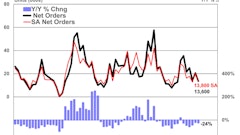People tell me that success in business requires sales skills. While I don't believe that's always the case, I think we can all take a lesson from Ron Campbell.
Ron Campbell tested high in intelligence and even higher in sales and business skills. His positive, high-energy outlook impressed the interviewers at Industrial Industries, and both his former employers raved about his ambition and his honesty. Bright, talented, upbeat, ambitious and ethical: those were the qualities that won Ron his dream job. And those were the qualities that caused him to quit in disgust less than a year later.
I met Ron while I was consulting with Industrial Industries, immediately after he'd been hired. Twenty-eight years old, he'd moved from a $38,000 per year sales rep position with a mom and pop operation to a "Professional Sales Career" with a Fortune 500 giant, where the average first year earnings were $76,000, and someone with Ron's potential could make well over $100,000. Then there was the company car, expenses, and a benefit package tempting enough to make you, me or anyone else question the joys of self-employment. As a result, Ron's infectious grin became a near-permanent fixture on his face.
When I arrived each morning at 7:30 AM, he was already in the training room, studying hard. When I left, sometimes as late as 7:30 or 8:00 in the evening, he'd still be around, usually picking the brain of anyone who had anything to teach him. In his second month on the job, the division manager asked him to deliver a motivational presentation at a key sales meeting. Even the veterans were impressed.
I figured he'd be a memory in 18 months. Cynicism was practically a job requirement at Industrial Industries. I'd seen too many of those who should have become the best and the brightest crushed by the realities of selling for such a demanding company. Ron seemed particularly vulnerable.
The day I finished my contract with the company, Ron volunteered to drive me to the airport; he wanted a chance to pick my brain. I gave him my card.
"Everyone around here has been raving about your potential," I said. "But if things ever get too rough, please give me a call before you do anything that can't be undone."
He thanked me, but assured me that he considered this job the chance of a lifetime. "I'm lashing myself to the saddle on this bronco," he said, reminding me that while Ron was from New Jersey, his sales manager was from Texas. "It can buck, it can even bite, but there's no way it's going to throw me."
The call came eight months later. He told me he was quitting the next day.
"Their prices are just too high," he explained. "I just can't sell their machines."
"Ron, you can sell anything you choose to sell."
"I can't sell this stuff. Not in amounts large enough to meet their ridiculous quotas."
"How many of the others are making their quotas?"
"Some of them. Most of them, I suppose. But the company puts so much pressure on the reps to make their numbers, who knows what they're telling the customers? I sell clean, and I don't sell enough. And I don't feel good about what I do sell. I get prospects to trust me, then use that trust to talk them into buying something they wouldn't have bought on their own. That's what selling is all about. And that may be fine if you've got the best product in the marketplace . . ." His voice trailed off.
"But," I said, finishing the thought, "not everybody can have the best product in the marketplace."
"That's the problem."
"That is a problem, Ron. But aren't you the guy that told a division meeting that in Chinese the word for problem is the same as the word for opportunity?"
"Crisis. The word for crisis is the same as the word for opportunity."
"You're quitting your job tomorrow, Ron. The job you told me was your chance of a lifetime. If this isn't a crisis, it will certainly do until one arrives."
So how did Ron fill the glass.
Simple. He's become a major resource, developing an expertise his customers no longer feel they can do without. "His machines may not be quite as reliable as his competition's," one of them admits. "But he knows more about that type of milling than anyone in the industry. The free information we get from him more than offsets the cost of the occasional problem his products may encounter. He's indispensable. Besides, when there is a problem, Ron's on it: practically before the machine stops humming."
I recently spoke with Bill Swetland, a customer service rep with Industrial Industries, Ron's company. "When one of Ron's accounts has a problem," Bill said, "he fights for them harder than they'd ever fight for themselves . . . Sometimes I wonder who he's working for."
"But that's part of what they're buying," Ron explains. "They're buying me. That's what they are paying for and that's what they get. I make sure I'm worth the extra money our products cost and then some."
Because he's free from doubt about the value his clients will be receiving, Ron can sell honestly. He can tell the truth to his customers and to himself and still close any deal. He sells to more customers and he sells more to each customer. And his referrals are astonishing.
Now those are the kind of sales skills we could all use. Because no matter what your function in your company, even if you never deal with a customer, part of what that customer is buying, is you.
Barry Maher speaks and writes on leadership, management, communication, marketing and sales. And he's an acclaimed and motivational keynote speaker. His books include Filling the Glass, No Lie: Truth Is the Ultimate Sales Tool, Getting the Most from Your Yellow Pages Advertising and The Prentice Hall Marketing Yearbook. Visit his website and sign up for his free newsletter at www.barrymaher.com or contact him at 760-962-9872.
Copyright 2007, Barry Maher, Las Vegas, Nevada. All rights reserved. Used by Permission.


























